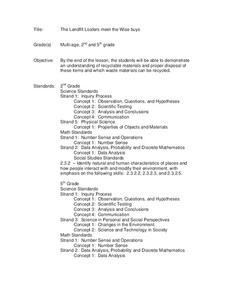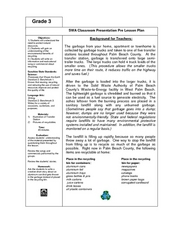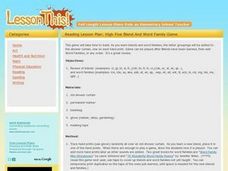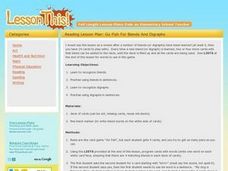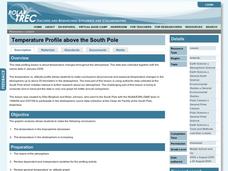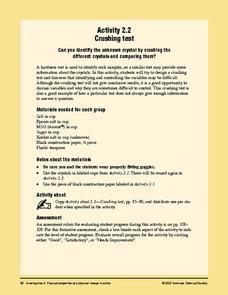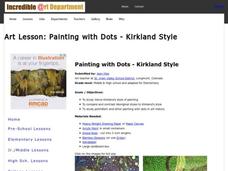Curated OER
Word Search
Here is a word search that has more educational value than most. After finding the 14 words that have to do with natural resources, learners must then use the words in context. They answer 14 questions on the second page of the...
Curated OER
The Landfill Loafers Meet the Wise Buys
Students discover recyclable materials and the proper disposal of those items through Internet research. Working in groups of four, they search the Internet for uses of recyclable materials. After research is complete, they participate...
Curated OER
Protecting Natural Resources
Third graders recognize what our natural resources are and their importance. In this natural resource recycling lesson, 3rd graders understand why it is important to recycle and conserve natural resources. Students can explain how...
Curated OER
Owls: Top of a Food Chain
Although written for middle schoolers, there is no reason that a 3rd, 4th, or 5th grader could not also learn about food chains through the dissection of owl pellets. After you introduce the topic, learners complete an owl research...
Curated OER
Independent Harmonies
Independent harmonies, homophonic music, intervals, and melody are all part of music theory and practice. Prepare your budding musicians for the big time with these activities focused on playing with accompaniment. This lesson is...
Curated OER
Fiber Fusion
Create works of art using fabric. Learners use fabric, tissue paper, acrylic gel, and paint to create a unique and interesting piece of work. They discuss the different techniques that can be used to create works of art and evaluate...
Curated OER
Density - An Intrinsic Property
Learners discover the property of density while participating in a lab exercise. For this scientific measuring lesson, pupils utilize a scale to measure the density of different metal materials. They document their work and present their...
Curated OER
I Just Drank George Washington's Water!
Guide your learners through the water cycle with this lesson plan. Over the course of the lesson, they read two Magic School Bus books, discuss the water cycle, come up with water facts, complete a diagram of the water cycle, recognize...
Curated OER
Living and Non-Living Things
Take a walk and observe living and non-living things on the way. Young scientists practice making valuable observations and draw the details. You could require that your students complete a T chart of living and non-living things and...
Curated OER
Learning Even and Odd Numbers
In this math lesson, young learners receive a numeral written on a paper and arrange themselves in chronological order. They illustrate skip counting by 2's, 5's, and 10's using their numerals and then complete an individual 100 chart by...
Curated OER
High Five Blend and Word Family Game
Practice using word blends and learning about word families by participating in a class game. Learners will collaborate as teams in a game by throwing beanbags onto a shower curtain with word blends on it. They will say the sound their...
Curated OER
Go Fish For Blends and Digraphs
Youngsters practice using blends and digraphs. In this early reading lesson, students play a game of "Go Fish" using words that contain a blend or digraph. This allows them to practice recognizing the word and using it in a sentence.
Curated OER
Litter From Lunchtime
Students explore environmental care by participating in a litter identification activity. In this food trash lesson, students discuss the destruction litter causes in our environment and ways we can avoid littering ourselves. Students...
SF Environment
Pre-School Composting and Recycling!
You can never be too young to get involved in composting or recycling. Here is a lesson that has been made for the very littlest learners and it's all about the importance of conservation. They'll sort compostable and recyclable objects,...
Curated OER
Recognizing Litter
When does trash become litter? Use this litter awareness lesson to help them understand the importance of trash disposal. Get learners engaged by reading Nancy Loewen's Lady Lulu Liked to Litter (not included). After discussing what...
Alabama Learning Exchange
Good Litter, Bad Litter
Which ones can be thrown on the ground? Discover the difference between natural litter and unhealthy trash, helping scholars by using several examples. Use the information here to give them a basic background, but also encourage prior...
Curated OER
How Much Are We Using?
Third graders investigate environmental stability through consumption and recycling. They look into how much of a recyclable good it takes to create one new product. Pupils compile a list of these quantities, then create posters that are...
Curated OER
Counting Mat
Using the provided counting mats (1-6 and 7-12) and small objects to count with, guide your young learners to match the correct number of objects to the written numeral and dots. Class members will either read the numeral and count out...
Polar Trec
Temperature Profile above the South Pole
Collecting and understanding data is a big part of understanding the world and how it changes. To better grasp what temperatures are changing and how they affect global populations, learners create a graph based on the date provided....
Krzysztof Haft-Szatynski
Move the Turtle
Turtles are not known to be speedy movers, but have you ever tried to get them to move in a specific direction? How about getting them to move in a perfect circle? With this app, young computer programmers have to be on their toes to...
American Chemical Society
Crushing Test
Solidify understanding of the properties of crystals by crushing them to compare hardness. After some class discussion, a procedure is planned, and then small groups go about making observations as they crush five different crystal...
American Chemical Society
Exploring Baking Powder
Meant to follow an activity in which young chemists identified an unknown substance by chemical reactions, they now take their data and use it to determine which materials combine to make up baking powder. This lesson is one that can be...
American Chemical Society
Neutralizing Acids and Bases
Now that your science class has experimented with pH indicator and identified acids and bases, they attempt to get the cabbage juice indicator back to its original color. This is done through neutralization of the acids and bases that...
Incredible Art
Painting with Dots - Kirkland Style
Pointillism is the focus of a lesson that asks young artists to compare Vance Kirkland's painting style with aboriginal dot art, and then to produce their own piece of dot art.
Other popular searches
- Reduce Reuse and Recycle
- Reduce Reuse Recycle
- Reduce Reuse Recycle Lesson
- Reduce Reuse Recycle Poems
- Reuse Trash Graphing
- Reuse Recycle
- Reduce, Reuse, Recycle
- Recycle, Reuse
- Recycle, Reuse, Reduce
- Reuse Clay
- Adaptive Reuse
- Recycling:reduce, Reuse



